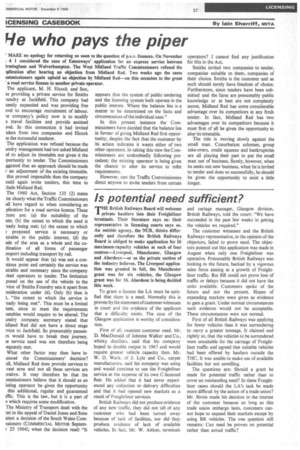Is potential need sufficient?
Page 39

If you've noticed an error in this article please click here to report it so we can fix it.
THE British Railways Board will welcome private hauliers into their Freightliner terminals. Their literature says so: their representative in licensing courts says so. An outside agency, the NUR, thinks differently and therefore the British Railways Board is obliged to make application for 16 maximum-capacity vehicles at each of four centres—Liverpool, Manchester, Glasgow and Aberdeen—or so the private section of the industry believes. The Liverpool application was granted in full, the Manchester grant was for six vehicles, the Glasgow grant was for 16. Aberdeen is being decided this week.
To grant a licence the LA must be satisfied that there is a need. Normally this is proven by the statement of customer witnesses in court and the evidence of the applicant that a difficulty exists. The case of the Glasgow application is worthy of consideration.
First of all, examine customer need. Mr. D. MacDonald of Johnnie Walker and Co., whisky distillers, said that his company hoped to double output in 1967 and would require greater vehicle capacity then. Mr. W. D. Wark, of J. Lyle and Co., carpet manufacturers, said his company was using and would continue to use the Freightliner service at the expense of its own C-licensed fleet. He added that it had never experienced any collection or delivery difficulties and that it had opened new markets as a result of Freightliner services.
British Railways did not produce evidence of any new traffic, they did not tell of any customer who had been turned away because of lack of facilities, nor did they produce evidence of lack of available vehicles. In fact, Mr. W. Aitken, terminals
and cartage manager, Glasgow division, British Railways, told the court: "We have succeeded in the past few weeks in getting the vehicles we required."
The customer witnesses and the British Railways representative, in the opinion of the objectors, failed to prove need. The objectors pointed out this application was made in August when only one Freightliner was operative. Presumably British Railways was looking to the future, backed by a vigorous sales force aiming at a growth of Freightliner traffic. But BR could not prove loss of traffic or delays because it did not have the units available. Customers spoke of the future and not the present. Hopes of expanding markets were given as evidence to gain a grant. Under normal circumstances such evidence would not be acceptable. These circumstances were not normal.
First of all British Railways was applying for fewer vehicles than it was surrendering to carry a greater tonnage. It claimed and rightly so, that the vehicles to be surrendered were unsuitable for the carriage of Freightliner traffic and agreed that suitable vehicles had been offered by hauliers outside the THC. It was unable to make use of available facilities but not unwilling.
The questions are: Should a grant be made for potential traffic rather than to cover an outstanding need? In these Freightliner cases should the LA's task be made more difficult by the action of a trade union? Mr. Birnie made his decision in the interest of the customer because so long as this trade union embargo lasts, customers cannot hope to expand their markets except by using BR vehicles. The one question still remains: Can need be proven on potential rather than actual traffic?












































































































